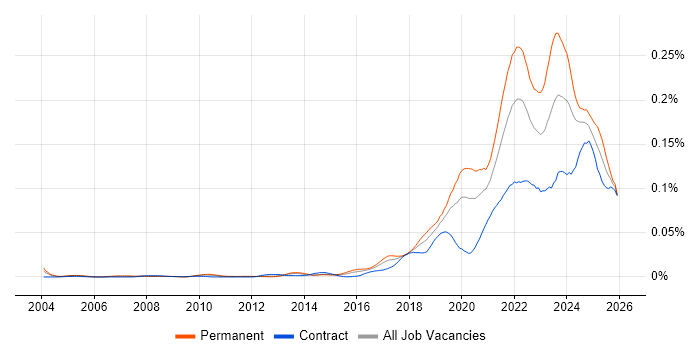Lead Data Engineer
UK
The median Lead Data Engineer salary in the UK is £94,637 per year, according to job vacancies posted during the 6 months leading to 30 April 2025.
The table below provides salary benchmarking and summary statistics, comparing them to the same period in the previous two years.
| 6 months to 30 Apr 2025 |
Same period 2024 | Same period 2023 | |
|---|---|---|---|
| Rank | 596 | 671 | 816 |
| Rank change year-on-year | +75 | +145 | +25 |
| Permanent jobs requiring a Lead Data Engineer | 88 | 216 | 171 |
| As % of all permanent jobs advertised in the UK | 0.17% | 0.22% | 0.16% |
| As % of the Job Titles category | 0.19% | 0.23% | 0.18% |
| Number of salaries quoted | 62 | 156 | 143 |
| 10th Percentile | £61,250 | £55,000 | £62,500 |
| 25th Percentile | £70,000 | £67,500 | £66,250 |
| Median annual salary (50th Percentile) | £94,637 | £75,000 | £85,000 |
| Median % change year-on-year | +26.18% | -11.76% | -2.86% |
| 75th Percentile | £100,000 | £95,000 | £97,500 |
| 90th Percentile | £109,500 | £103,750 | £114,750 |
| UK excluding London median annual salary | £75,000 | £75,000 | £74,500 |
| % change year-on-year | - | +0.67% | +2.76% |
All Permanent IT Job Vacancies
UK
For comparison with the information above, the following table provides summary statistics for all permanent IT job vacancies. Most job vacancies include a discernible job title that can be normalized. As such, the figures in the second row provide an indication of the number of permanent jobs in our overall sample.
| Permanent vacancies in the UK with a recognized job title | 46,971 | 93,051 | 95,196 |
| % of permanent jobs with a recognized job title | 90.06% | 94.62% | 91.53% |
| Number of salaries quoted | 27,308 | 66,827 | 59,871 |
| 10th Percentile | £30,000 | £28,500 | £32,500 |
| 25th Percentile | £42,500 | £38,500 | £45,000 |
| Median annual salary (50th Percentile) | £57,500 | £52,750 | £60,000 |
| Median % change year-on-year | +9.00% | -12.08% | - |
| 75th Percentile | £75,000 | £71,250 | £81,250 |
| 90th Percentile | £97,500 | £90,000 | £100,000 |
| UK excluding London median annual salary | £52,344 | £50,000 | £52,500 |
| % change year-on-year | +4.69% | -4.76% | +5.00% |
Lead Data Engineer
Job Vacancy Trend
Job postings that featured Lead Data Engineer in the job title as a proportion of all IT jobs advertised.

Lead Data Engineer
Salary Trend
3-month moving average salary quoted in jobs citing Lead Data Engineer.
Lead Data Engineer
Salary Histogram
Salary distribution for jobs citing Lead Data Engineer over the 6 months to 30 April 2025.
Lead Data Engineer
Top 13 Job Locations
The table below looks at the demand and provides a guide to the median salaries quoted in IT jobs citing Lead Data Engineer within the UK over the 6 months to 30 April 2025. The 'Rank Change' column provides an indication of the change in demand within each location based on the same 6 month period last year.
| Location | Rank Change on Same Period Last Year |
Matching Permanent IT Job Ads |
Median Salary Past 6 Months |
Median Salary % Change on Same Period Last Year |
Live Jobs |
|---|---|---|---|---|---|
| England | +114 | 87 | £94,637 | +26.18% | 41 |
| London | +95 | 55 | £96,000 | +6.67% | 25 |
| UK excluding London | +89 | 31 | £75,000 | - | 15 |
| Work from Home | +104 | 29 | £85,000 | +6.25% | 27 |
| North of England | +34 | 13 | £75,000 | -6.25% | 6 |
| North West | +10 | 10 | £75,000 | +7.14% | 4 |
| South East | +113 | 9 | £70,000 | -6.67% | 4 |
| South West | +104 | 6 | £98,420 | +39.45% | 1 |
| Midlands | +62 | 3 | £57,500 | -28.13% | 1 |
| Yorkshire | +59 | 2 | £54,228 | -36.20% | 2 |
| West Midlands | +51 | 2 | £60,000 | -25.00% | 1 |
| North East | +36 | 1 | £72,500 | -7.94% | |
| East Midlands | - | 1 | £57,500 | - |
Lead Data Engineer Skill Set
Top 30 Co-occurring Skills and Capabilities
For the 6 months to 30 April 2025, Lead Data Engineer job roles required the following skills and capabilities in order of popularity. The figures indicate the absolute number co-occurrences and as a proportion of all permanent job ads featuring Lead Data Engineer in the job title.
|
|
Lead Data Engineer Skill Set
Co-occurring Skills and Capabilities by Category
The follow tables expand on the table above by listing co-occurrences grouped by category. The same employment type, locality and period is covered with up to 20 co-occurrences shown in each of the following categories:
|
|
||||||||||||||||||||||||||||||||||||||||||||||||||||||||||||||||||||||||||||||||||||||||||||||||||||||||||||||||||||||||||||||
|
|
||||||||||||||||||||||||||||||||||||||||||||||||||||||||||||||||||||||||||||||||||||||||||||||||||||||||||||||||||||||||||||||
|
|
||||||||||||||||||||||||||||||||||||||||||||||||||||||||||||||||||||||||||||||||||||||||||||||||||||||||||||||||||||||||||||||
|
|
||||||||||||||||||||||||||||||||||||||||||||||||||||||||||||||||||||||||||||||||||||||||||||||||||||||||||||||||||||||||||||||
|
|
||||||||||||||||||||||||||||||||||||||||||||||||||||||||||||||||||||||||||||||||||||||||||||||||||||||||||||||||||||||||||||||
|
|
||||||||||||||||||||||||||||||||||||||||||||||||||||||||||||||||||||||||||||||||||||||||||||||||||||||||||||||||||||||||||||||
|
|
||||||||||||||||||||||||||||||||||||||||||||||||||||||||||||||||||||||||||||||||||||||||||||||||||||||||||||||||||||||||||||||
|
|
||||||||||||||||||||||||||||||||||||||||||||||||||||||||||||||||||||||||||||||||||||||||||||||||||||||||||||||||||||||||||||||
